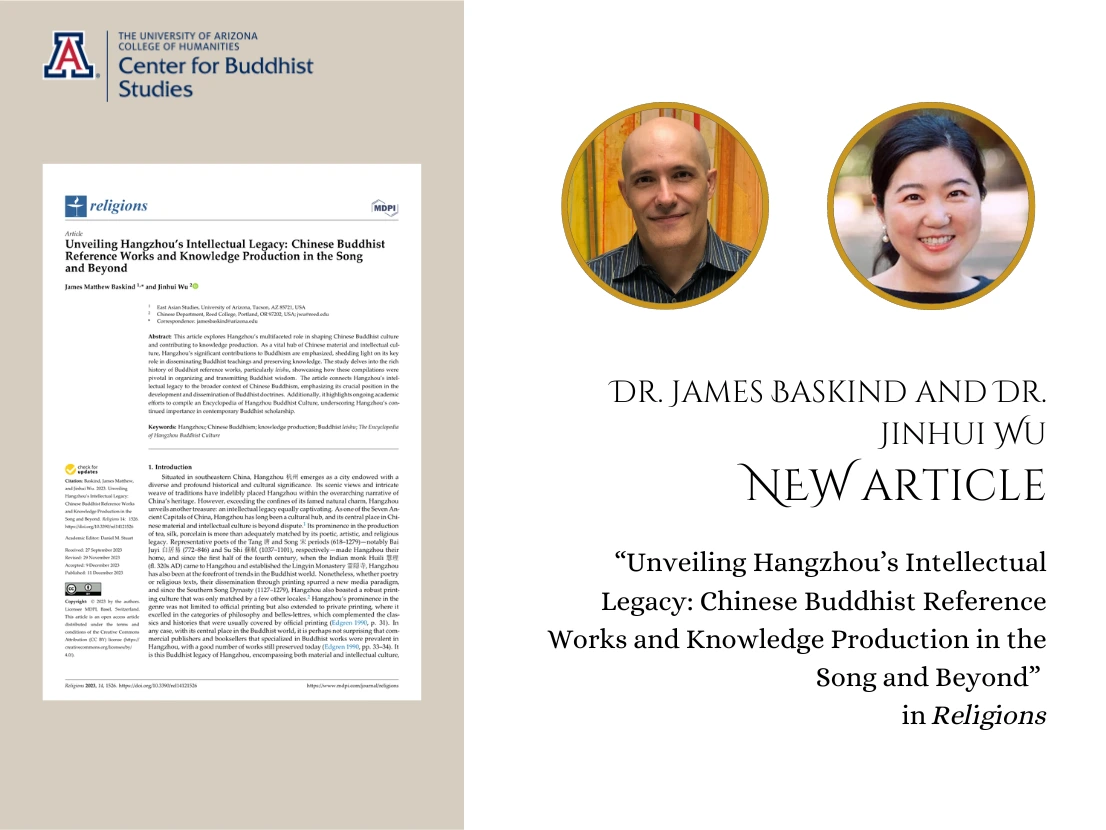
Dr. James Baskind and Dr. Jinhui Wu, our center's fellows, have published "Unveiling Hangzhou's Intellectual Legacy: Chinese Buddhist Reference Works and Knowledge Production in the Song and Beyond" in the journal Religions in December 2023.
Abstract:
This article explores Hangzhou’s multifaceted role in shaping Chinese Buddhist culture and contributing to knowledge production. As a vital hub of Chinese material and intellectual culture, Hangzhou’s significant contributions to Buddhism are emphasized, shedding light on its key role in disseminating Buddhist teachings and preserving knowledge. The study delves into the rich history of Buddhist reference works, particularly leishu, showcasing how these compilations were pivotal in organizing and transmitting Buddhist wisdom. The article connects Hangzhou’s intellectual legacy to the broader context of Chinese Buddhism, emphasizing its crucial position in the development and dissemination of Buddhist doctrines. Additionally, it highlights ongoing academic efforts to compile an Encyclopedia of Hangzhou Buddhist Culture, underscoring Hangzhou’s continued importance in contemporary Buddhist scholarship.
Author:
Dr. Baskind received his Ph.D. from Yale University in 2006. His area of academic research is Japanese Buddhism and culture, with a focus on how Chinese models—represented by the Obaku School—were received in Edo-period Japan. Other areas of research and writing include Buddhist-Christian interaction in early modern Japan, as well as the Zen/Pure Land dialectic as it pertains to Japanese Buddhist discourse. His current project critically examines tea culture in East Asia, and how it became widely perceived as inextricably linked with Zen and its associated arts. Most recently he held the position of Associate Professor of Japanese Thought at Nagoya City University in Nagoya, Japan.
Dr. Jinhui Wu currently holds the position of Visiting Professor of Chinese and Humanities at Reed College. She received her M.A. degree in Chinese Language and Civilization (and certificates in College Teaching and Language Teaching with Technology) from the University of Colorado Boulder, and her Ph.D. in East Asian Studies from the University of Arizona. She studies early modern Chinese religious literature and its intersection with other socio-cultural spheres, from the perspectives of historiography, vernacular literature, ritual practices, and print culture. Her other research interests include translation studies, digital humanities, and Chinese language and culture pedagogy.
See more at: https://www.mdpi.com/2077-1444/14/12/1526
Abstract:
This article explores Hangzhou’s multifaceted role in shaping Chinese Buddhist culture and contributing to knowledge production. As a vital hub of Chinese material and intellectual culture, Hangzhou’s significant contributions to Buddhism are emphasized, shedding light on its key role in disseminating Buddhist teachings and preserving knowledge. The study delves into the rich history of Buddhist reference works, particularly leishu, showcasing how these compilations were pivotal in organizing and transmitting Buddhist wisdom. The article connects Hangzhou’s intellectual legacy to the broader context of Chinese Buddhism, emphasizing its crucial position in the development and dissemination of Buddhist doctrines. Additionally, it highlights ongoing academic efforts to compile an Encyclopedia of Hangzhou Buddhist Culture, underscoring Hangzhou’s continued importance in contemporary Buddhist scholarship.
Author:
Dr. Baskind received his Ph.D. from Yale University in 2006. His area of academic research is Japanese Buddhism and culture, with a focus on how Chinese models—represented by the Obaku School—were received in Edo-period Japan. Other areas of research and writing include Buddhist-Christian interaction in early modern Japan, as well as the Zen/Pure Land dialectic as it pertains to Japanese Buddhist discourse. His current project critically examines tea culture in East Asia, and how it became widely perceived as inextricably linked with Zen and its associated arts. Most recently he held the position of Associate Professor of Japanese Thought at Nagoya City University in Nagoya, Japan.
Dr. Jinhui Wu currently holds the position of Visiting Professor of Chinese and Humanities at Reed College. She received her M.A. degree in Chinese Language and Civilization (and certificates in College Teaching and Language Teaching with Technology) from the University of Colorado Boulder, and her Ph.D. in East Asian Studies from the University of Arizona. She studies early modern Chinese religious literature and its intersection with other socio-cultural spheres, from the perspectives of historiography, vernacular literature, ritual practices, and print culture. Her other research interests include translation studies, digital humanities, and Chinese language and culture pedagogy.
See more at: https://www.mdpi.com/2077-1444/14/12/1526

